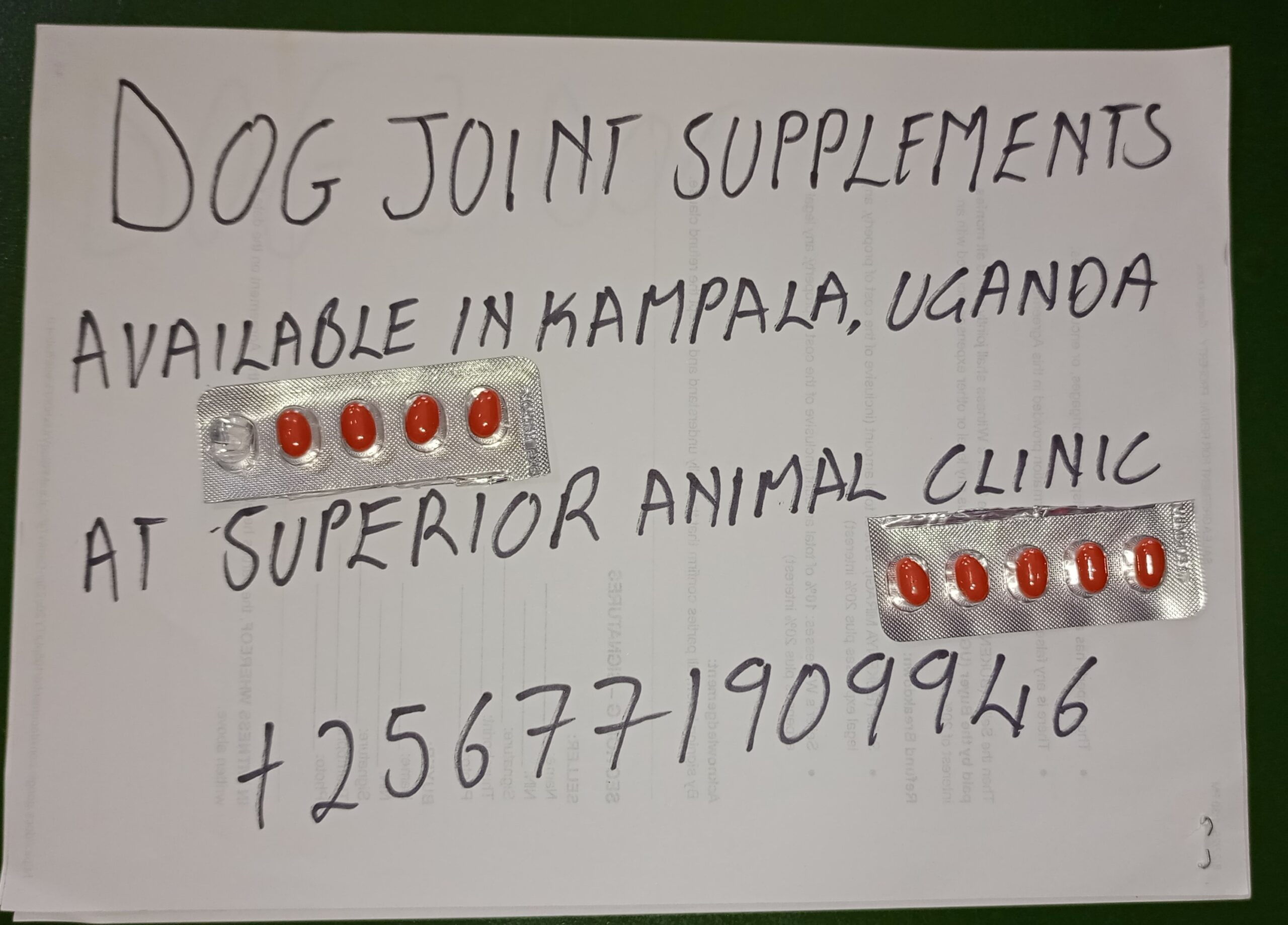
“I thought my dog was just getting old — until I learned what was really happening.”
It started one Sunday morning in Makindye.
Sarah, a loving dog mom, noticed her eight-year-old Labrador, Bruno, struggling to get up after his nap. Normally, he’d sprint to the gate, tail wagging, ready for their daily walk. But that morning, he stayed curled up, his eyes following her as if to say, “I want to, but it hurts.”
Like many pet owners in Kampala, Sarah assumed it was just age catching up. She tried to comfort him, hoping he’d bounce back. But over the next few weeks, Bruno’s limp worsened — climbing stairs became a battle, and his once-playful spirit faded.
When she finally brought him to Superior Animal Clinic along Salaama Road, our team performed a physical exam and joint X-rays. The diagnosis? Osteoarthritis — a common joint condition that affects countless dogs in Uganda, especially large breeds like Labradors, Rottweilers, and German Shepherds.
The good news? Bruno’s story didn’t end there. With a personalized care plan, including veterinary-recommended joint supplements, dietary adjustments, and light exercise, Bruno was back on his feet in just a few weeks — tail wagging again, ready to guard the compound and chase his favorite ball.
Why this story matters to you
Joint problems are one of the most overlooked issues among dogs in Kampala. Our climate, urban surfaces, and the popularity of large dog breeds make these conditions even more common. But with early intervention and the right supplements, your dog doesn’t have to live in pain or lose their mobility.
At Superior Animal Clinic, we’ve helped hundreds of dogs across neighborhoods like Ntinda, Muyenga, Kansanga, and Rubaga regain their freedom of movement through safe, vet-approved joint supplements and tailored care.
In this guide, you’ll learn:
- The different types of joint supplements available in Kampala and their prices
- The breeds and ages of dogs that need them most — and why
- How to give joint supplements safely and when they work best
- The key ingredients that make supplements effective
- Possible side effects and natural alternatives
- And, most importantly, how to choose the right product for your dog
By the end, you’ll know exactly how to help your dog live a longer, more active, pain-free life — right here in Kampala.
🦴 Types of Dog Joint Supplements Available in Kampala, Uganda
When shopping for joint supplements in Kampala, you’ll notice that they come in different forms — powders, chewable tablets, liquids, and even special dog foods. Each form works the same way (to support healthy cartilage and reduce inflammation), but the choice depends on your dog’s size, taste preference, and how easy it is to give.
Here’s a breakdown of the main types you’ll find across veterinary clinics like Superior Animal Clinic, pet stores, and online marketplaces or local suppliers around Makindye, Ntinda, Muyenga, Kansanga, and other neighborhoods.
1. Powder Joint Supplements
Best for: Picky eaters or dogs on home-prepared meals.
How it’s used: Powders are sprinkled or mixed directly into your dog’s food. They blend well with both dry kibble and wet meals, making them easy to administer.
Common ingredients: Glucosamine, chondroitin sulfate, MSM, collagen, hyaluronic acid, and omega-3 fatty acids.
Advantages:
- Easy to mix and measure by weight.
- Good absorption since it’s mixed with food.
- Great option for dogs who dislike tablets.
Typical price range in Kampala: UGX 200,000 – 400,000 per pack, depending on size and concentration.
2. Chewable Tablets and Soft Chews
Best for: Dogs that enjoy treats.
How it’s used: These look and taste like treats — simply give one daily or as directed by your vet. Most dogs love them because they’re flavored (beef, chicken, or peanut butter).
Common ingredients: Glucosamine + chondroitin, MSM, omega-3, collagen, and vitamin E.
Advantages:
- Convenient and mess-free.
- Ideal for busy pet parents.
- Easy to dose by body weight (small, medium, large).
Typical price range in Kampala: UGX 150,000 per tablet - Pro tip: Store in a cool place — Kampala’s warm climate can soften or melt certain chews.
3. Liquid and Syrup Joint Supplements
Best for: Small dogs, puppies at risk, or senior dogs with chewing difficulty.
How it’s used: Measure the required amount and pour over food or give directly by mouth using a syringe.
Common ingredients: Glucosamine HCL, chondroitin, MSM, and sometimes herbal extracts or omega-3 oils.
Advantages:
- Very easy to dose for small breeds.
- Fast absorption through the digestive tract.
- Often has pleasant flavor (chicken or fish oil).
Typical price range in Kampala: UGX 180,000 – 350,000 per bottle.
4. Capsules or Pills
Best for: Owners comfortable giving oral medications and dogs used to taking tablets.
How it’s used: Given whole or hidden inside food/treats.
Common ingredients: High-dose glucosamine sulfate, chondroitin, MSM, and antioxidants.
Advantages:
- Precise dosage and long shelf life.
- Suitable for dogs on measured supplement routines.
Drawbacks: - Some dogs may resist swallowing pills.
Typical price range in Kampala: UGX 15,000 per capsule.
5. Veterinary Injectable Joint Therapies
Best for: Dogs with advanced arthritis, hip dysplasia, or those unresponsive to oral supplements.
How it’s used: Administered by a veterinarian at the clinic — usually as weekly or monthly injections that support cartilage regeneration and joint lubrication.
Common active ingredients: Polysulfated glycosaminoglycans (PSGAGs) or hyaluronic acid formulations.
Advantages:
- Direct delivery to the bloodstream — faster effect.
- Useful for severe or chronic joint disease.
Drawbacks: - Must be given under veterinary supervision.
Typical cost in Kampala: Around UGX 80,000 – 150,000 per injection, depending on dose and product type. (NOT READILY AVAILABLE)
6. Joint-Supportive Dog Foods and Treats
Best for: Long-term maintenance or prevention in active or aging dogs.
How it’s used: As the dog’s main daily diet or in combination with other supplements.
Common ingredients: Glucosamine, omega-3 (from salmon oil), antioxidants, and added vitamins.
Advantages:
- Provides daily joint support through normal feeding.
- No need to give separate tablets or powders.
Drawbacks: - Slower effect for dogs already showing signs of arthritis.
- Can be expensive for large breeds.
Typical cost in Kampala: UGX 250,000 – 500,000 per 10 kg bag, depending on brand and imported quality.
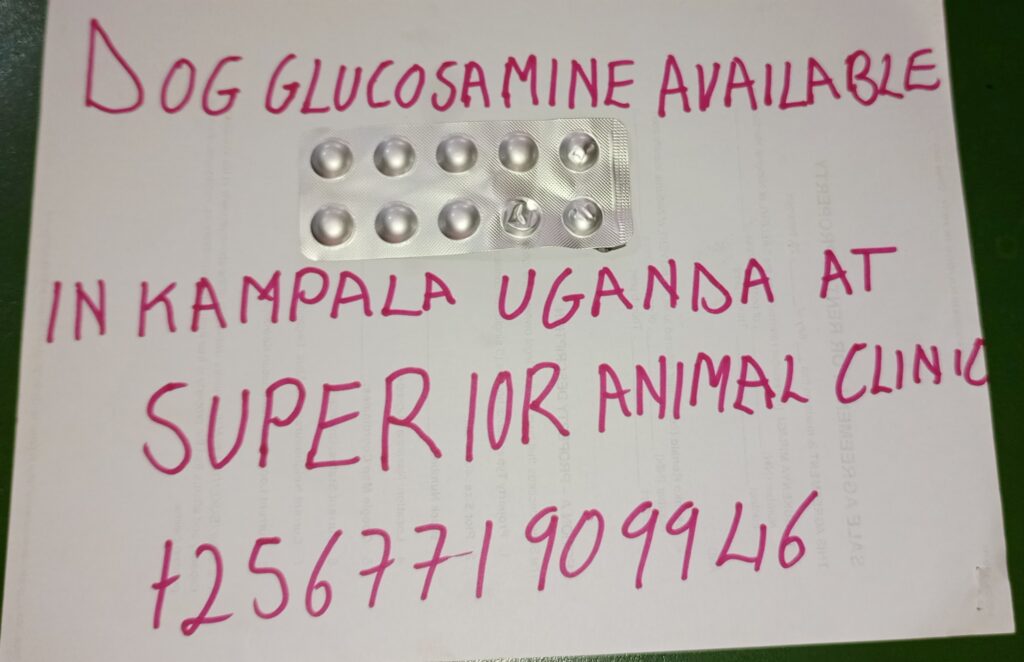
💡 Vet’s Tip from Superior Animal Clinic:
“The best form of joint supplement is the one your dog will actually take every day. Consistency matters more than the format — whether it’s powder, chew, or syrup. What’s most important is the right dosage, ingredient quality, and your dog’s comfort level.”
🐾 Quick Comparison Table
| Supplement Type | Ideal For | Common Price Range (UGX) |
|---|---|---|
| Powder | Picky eaters | 200,000 – 400,000 |
| Chewables / Soft Chews | Dogs that love treats | 15,000 |
| Liquid / Syrup | Small or senior dogs | 180,000 – 350,000 |
| Capsules / Pills | Experienced owners | 15,000 |
| Injectables | Advanced arthritis | 80,000 – 150,000 per injection |
| Joint Foods | Long-term prevention | 250,000 – 500,000 per 10 kg |
🦴 Benefits of Joint Supplements for Dogs in Uganda
If you’ve ever watched your once playful dog struggle to stand, hesitate to climb stairs, or limp after a walk, you know how heartbreaking joint pain can be. In Uganda, especially around Kampala where most dogs live on tiled floors, rough compounds, or uneven ground, joint issues are more common than many owners realize.
Joint supplements play a crucial role in keeping dogs active, comfortable, and pain-free — whether your pet is a growing puppy, a working dog, or a senior companion.
Let’s explore why joint supplements matter and the incredible benefits they provide for dogs in Uganda.
🦴 1. Supports Healthy Joint Development in Puppies
For growing dogs, joint supplements lay the foundation for a lifetime of mobility. Puppies — especially large breeds like German Shepherds, Rottweilers, and Labradors — grow rapidly, putting extra strain on their bones and joints.
Benefits:
- Strengthens developing cartilage and bone structure.
- Prevents early-onset hip and elbow dysplasia.
- Promotes smoother, more balanced movement as the puppy grows.
Example: Many Ugandan pet owners who start supplements early notice their large-breed puppies develop fewer leg deformities and grow into stronger, more agile adults.
🦮 2. Reduces Joint Pain and Stiffness in Adult and Senior Dogs
As dogs age, natural wear and tear leads to arthritis, joint inflammation, and stiffness, particularly in Kampala’s active pets that often jump, run, and guard.
Benefits:
- Lubricates joints to improve flexibility.
- Reduces inflammation and discomfort.
- Helps older dogs regain their ability to walk, run, and play comfortably.
At Superior Animal Clinic, we’ve seen dogs that could barely walk begin to move comfortably again within weeks of starting a proper joint supplement plan.
🐕 3. Prevents Joint Damage in Active or Working Dogs
In Uganda, many dogs — like security dogs, hunting dogs, and herding breeds — lead highly active lives. Over time, repetitive stress and jumping can cause micro-injuries to joints.
Benefits:
- Protects cartilage from wear and tear.
- Speeds up post-exercise recovery.
- Keeps working dogs strong, agile, and pain-free throughout their service years.
Pro Tip: If your dog regularly runs on hard surfaces or jumps fences, joint supplements are not optional — they’re preventive medicine.
🐩 4. Promotes Faster Recovery After Injury or Surgery
After accidents or orthopedic surgeries, dogs need extra nutritional support for cartilage repair and bone healing.
Benefits:
- Accelerates tissue regeneration.
- Reduces inflammation and swelling.
- Strengthens healing joints and muscles.
At Superior Animal Clinic, we often recommend liquid or capsule-based glucosamine and MSM supplements for post-surgery recovery — especially for dogs treated for fractures, dislocations, or cruciate ligament injuries.
🧡 5. Enhances Mobility and Quality of Life
A healthy, pain-free dog is a happy dog. Joint supplements help pets regain their independence and joy — they can jump onto your couch again, chase their ball, or walk beside you without pain.
Benefits:
- Improves balance, movement, and endurance.
- Helps overweight dogs move more comfortably during exercise.
- Boosts energy and overall wellbeing.
Real Example: Many clients at Superior Animal Clinic report seeing their senior dogs “act like puppies again” after a few weeks of consistent supplementation.
🩺 6. Delays or Prevents the Onset of Arthritis and Hip Dysplasia
In Uganda’s warm climate, dogs may seem comfortable year-round, but joint degeneration often happens silently. Early supplementation helps protect cartilage before signs of pain even appear.
Benefits:
- Prevents early joint deterioration.
- Reduces long-term veterinary costs by avoiding surgery.
- Keeps adult dogs active for years longer.
Breeds at Higher Risk:
German Shepherds, Golden Retrievers, Rottweilers, Labradors, Boerboels, and even older mixed breeds.
🌿 7. Provides Natural Anti-Inflammatory and Antioxidant Support
Many joint supplements contain natural ingredients like turmeric, green-lipped mussel, and omega-3 oils — all proven to reduce inflammation and protect cells from damage.
Benefits:
- Decreases joint swelling naturally.
- Supports the immune system and heart health.
- Provides long-term protection against chronic inflammation.
🦷 8. Complements a Balanced Diet and Lifestyle
Even the best diet may not provide enough glucosamine or chondroitin for joint repair. Supplements fill that nutritional gap.
Benefits:
- Balances your dog’s overall nutrition.
- Improves response to exercise and physiotherapy.
- Makes other treatments (like pain medication) more effective.

💬 What This Means for Ugandan Dog Owners
Whether you live in Makindye, Muyenga, Ntinda, or Lubowa, investing in a quality joint supplement is one of the best long-term decisions you can make for your dog’s health.
Joint supplements don’t just extend your dog’s lifespan — they improve the years they live. A comfortable, mobile dog is happier, more social, and more emotionally connected with you.
🩷 At Superior Animal Clinic, Kampala
Our veterinarians assess each dog’s age, breed, and activity level before recommending the right joint supplement plan. We also guide owners on proper diet, weight control, and exercise, which work hand-in-hand with supplementation to ensure your dog stays active and pain-free.
🐕 Which Dogs Need Joint Supplements In Uganda — and Why
Just like humans, dogs’ joints take a beating over time — especially with all the running, jumping, and tail-wagging they do. Some dogs need joint supplements as a form of early protection, while others need them to relieve pain, stiffness, or mobility problems.
At Superior Animal Clinic in Kampala, we often meet pet owners who wish they’d started joint supplements earlier — especially for breeds genetically prone to joint issues. Understanding which dogs benefit most can save your pet years of discomfort and costly treatment later on.
Let’s break it down.
🐾 1. Large and Giant Breeds
Examples: German Shepherds, Rottweilers, Labradors, Great Danes, Boerboels
These dogs grow fast and carry more body weight — putting constant pressure on their hips and knees. Over time, their cartilage wears down, leading to hip dysplasia, arthritis, and joint pain.
Why They Need Supplements:
- Large breeds naturally produce less joint fluid compared to the stress on their bones.
- Supplements rich in glucosamine and chondroitin help strengthen cartilage and improve lubrication.
- Early prevention can delay arthritis onset and reduce costly vet bills later.
Vet’s Tip: Start preventive joint supplements as early as 6 months for large breeds, even before symptoms appear.
🐶 2. Senior and Aging Dogs (7 Years and Above)
Examples: Senior Labradors, Golden Retrievers, Poodles, Beagles
As dogs age, their cartilage thins and the natural production of joint fluid declines. You may notice your dog getting up slowly, limping after naps, or avoiding stairs.
Why They Need Supplements:
- Supplements restore lost joint cushioning and reduce inflammation.
- Ingredients like MSM, Omega-3s, and Turmeric extract relieve stiffness and pain naturally.
- They help maintain comfort and quality of life in golden years.
Real Example: Many older dogs visiting our clinic in Makindye and Muyenga show dramatic improvement in walking comfort within 2–4 weeks of starting a liquid glucosamine supplement.
🐕🦺 3. Active, Working, and Sporting Dogs
Examples: Security dogs, K9 units, herding dogs, agility or hunting breeds
These dogs have intense physical routines that put repetitive stress on joints and muscles.
Why They Need Supplements:
- Daily strain can cause micro-tears in cartilage, leading to early arthritis.
- Supplements support joint recovery and reduce inflammation after long training days.
- They promote endurance, flexibility, and long-term joint health.
Vet’s Insight: Even young active dogs can benefit from joint support to maintain optimal mobility and performance.
🐩 4. Small and Toy Breeds
Examples: Poodles, Chihuahuas, Shih Tzus, Yorkies
Though lightweight, small dogs often suffer from luxating patella (slipping kneecaps) — a painful joint disorder common in Kampala’s indoor pets.
Why They Need Supplements:
- Supplements strengthen ligaments around the knee joint.
- They reduce pain and prevent worsening of early-stage luxation.
- They also help offset the effects of indoor inactivity and slippery floors.
Pro Tip: Look for chewable or soft treat supplements with collagen and glucosamine — perfect for tiny, picky eaters.
🦴 5. Overweight Dogs
Any Breed — Especially Labradors, Beagles, and Mixed Breeds
Extra body weight puts heavy strain on joints, especially hips and elbows. In Kampala, we see many urban dogs gaining weight due to less exercise and rich diets.
Why They Need Supplements:
- Reduces inflammation caused by joint overloading.
- Improves mobility so your dog can exercise and shed extra weight.
- Prevents cartilage damage that leads to chronic arthritis.
Vet’s Tip: Combine joint supplements with a balanced weight-loss diet for best results.
🩺 6. Dogs Recovering from Injury or Orthopedic Surgery
Examples: Any breed recovering from fractures, ligament tears, or hip surgery.
After bone or ligament surgery, dogs need extra support for tissue repair and inflammation control.
Why They Need Supplements:
- Promotes cartilage and collagen regeneration.
- Reduces post-surgery stiffness and pain.
- Speeds up full recovery and mobility.
At Superior Animal Clinic, we often recommend liquid joint supplements with added MSM and hyaluronic acid during post-operative recovery to strengthen joint healing.
🐕 7. Dogs with a Family History of Joint Disease
If your dog’s parents or littermates have suffered from hip dysplasia or arthritis, early preventive supplementation is key.
Why They Need Supplements:
- Some breeds are genetically predisposed to joint conditions.
- Starting supplements before symptoms appear strengthens cartilage early.
- Preventive care is far cheaper and safer than late treatment.
Local Note: In Kampala, German Shepherds and Rottweilers from certain breeding lines are especially prone — we often start them on low-dose glucosamine as early as 5–6 months old.
❤️ 8. Dogs Showing Early Warning Signs of Joint Pain
Even if your dog hasn’t been diagnosed with arthritis, early signs mean it’s time to act.
Watch for:
- Limping after rest
- Difficulty climbing stairs or jumping
- Stiffness in the morning
- Slower movements
- Reluctance to play or exercise
Why They Need Supplements:
- Early joint support slows cartilage wear and restores mobility.
- Helps prevent irreversible joint damage.
Vet’s Advice: If your dog is showing any of these symptoms, schedule a joint health check at Superior Animal Clinic for proper diagnosis before starting supplements.
🧠 Final Thoughts: Prevention Is Always Better Than Cure
Joint supplements aren’t just for old or sick dogs — they’re an investment in lifelong mobility. Starting early, especially for high-risk breeds or active pets, can prevent painful conditions down the road.
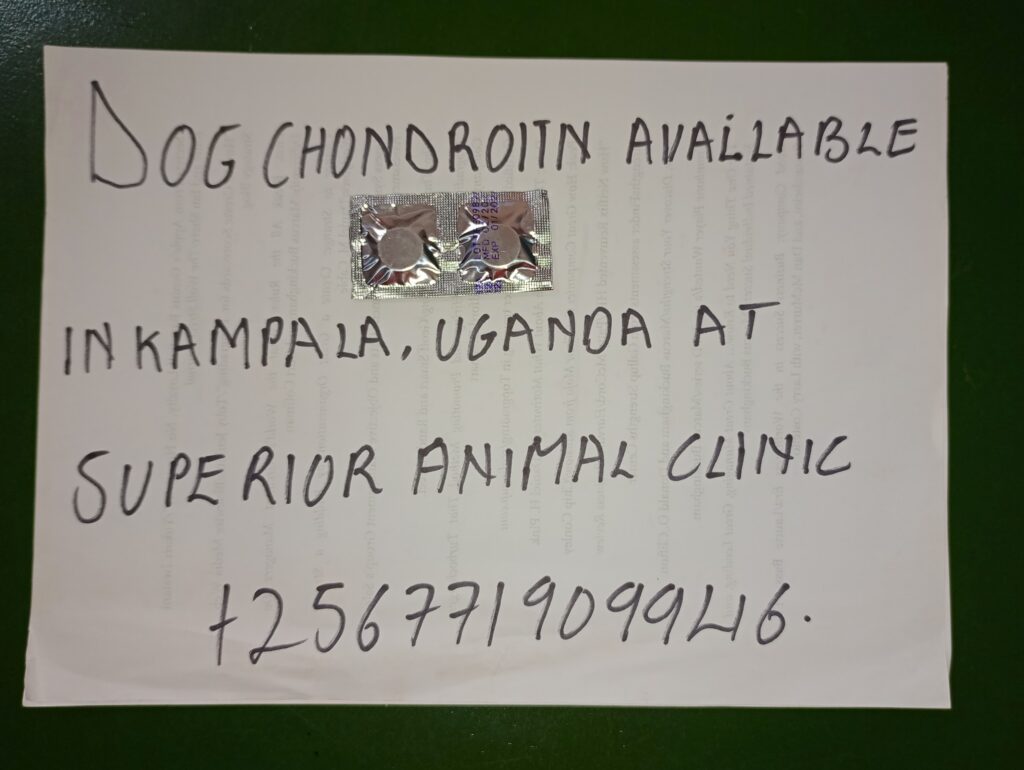
⏱ How Joint Supplements Are Given — Dosing and Timing in Uganda
Giving your dog a joint supplement in Kampala isn’t just about picking the right product — how much and when you give it makes a huge difference in its effectiveness. At Superior Animal Clinic, we often see well-intentioned dog owners using the right supplements but not seeing results because of inconsistent dosing or timing. Here’s a guide to get it right.
1. Follow Weight-Based Dosing Guidelines
The amount of supplement your dog needs usually depends on body weight and health status:
- Small dogs (up to 10 kg): typically require lower doses — for example, 250–500 mg of glucosamine per day.
- Medium dogs (10–25 kg): require a moderate dose — often 500–1000 mg daily.
- Large and giant dogs (25+ kg): need higher doses — sometimes 1000–2000 mg per day.
Important: Always check the supplement label for exact mg per serving, and adjust based on your vet’s advice. Dosing too low may not work, while too high can cause mild stomach upset.
2. Start With a Loading Phase (Optional but Recommended)
Many vets in Kampala recommend a loading phase for maximum early benefit:
- Duration: Usually 4–6 weeks.
- Purpose: Quickly saturates the dog’s joints with nutrients to help repair cartilage and reduce inflammation.
- Example: Giving 1.5–2 times the normal daily dose (under vet supervision) for the first month, then dropping to a maintenance dose.
At Superior Animal Clinic, we use this approach for large breeds like German Shepherds and Labradors with early arthritis. It helps dogs regain mobility faster and reduces morning stiffness.
3. Maintain a Consistent Daily Routine
Joint supplements are most effective when given consistently:
- Timing: Try to give supplements at the same time every day — morning or evening — to maintain steady nutrient levels in the body.
- Consistency matters more than exact time of day: Even a small delay occasionally is fine, but daily administration is key.
For dogs in Kampala, consistency is crucial, especially for active breeds like Rottweilers or working dogs that experience daily joint stress.
4. Monitor Response and Adjust with Vet Guidance
- Most dogs take 4–12 weeks before noticeable improvement in mobility or stiffness.
- Watch for: increased energy, longer playtime, smoother walking, or less morning stiffness.
- If no improvement after 12 weeks, consult your vet — you may need a dose adjustment or combination therapy.
Example: At Superior Animal Clinic, we sometimes combine glucosamine, chondroitin, and omega-3 fatty acids for dogs showing mild improvement but persistent joint stiffness.
5. Consider Seasonal or Environmental Factors in Kampala
- During rainy seasons, muddy walks can increase joint stress, and dogs may need careful monitoring.
- Hot, humid weather can make older dogs more lethargic — maintain proper hydration and consistent supplement administration to keep joints functioning well.
- Large dogs in urban areas (Makindye, Ntinda, Muyenga) that frequently climb stairs or jump fences may benefit from strict adherence to daily dosing.
6. Partner With Your Veterinarian
Even though many joint supplements are available over-the-counter in Kampala, dosing is not one-size-fits-all:
✅ Baseline joint assessment — physical exam and sometimes X-rays.
✅ Personalized dose based on breed, age, activity, and weight.
✅ Monitoring for side effects like mild diarrhea or soft stools.
✅ Adjusting dose if your dog gains weight, becomes more active, or develops a new joint condition.
Following this guidance ensures that your dog receives the full benefit of the supplement without wasting money or risking discomfort.
📝 Key Takeaways
- Dose by weight — small, medium, and large dogs need different amounts.
- Consider a loading phase for faster results under vet supervision.
- Give supplements consistently at the same time every day.
- Monitor progress and adjust with your vet if needed.
- Account for environment and activity in Kampala — rainy seasons, stairs, or high-impact play can influence joint stress.
🐾 Conditions in Dogs That Require Joint Supplements — Breeds Most Affected in Kampala
As a dog owner in Kampala, it’s important to understand that joint problems are not one-size-fits-all. Different breeds are prone to specific joint conditions due to their genetics, body structure, and lifestyle. Early intervention with joint supplements can help manage pain, slow disease progression, and improve mobility. Here’s a detailed breakdown tailored to local dog populations:
1. Osteoarthritis (Degenerative Joint Disease)
What it is: A chronic condition where joint cartilage gradually wears away, leading to stiffness, pain, and reduced mobility.
Breeds commonly affected in Kampala:
- Labradors – overweight and high activity levels accelerate joint wear.
- German Shepherds – predisposed due to genetic hip dysplasia risk and high activity.
- Rottweilers & Great Danes – large body size increases stress on joints.
Why supplements help:
- Glucosamine and chondroitin slow cartilage breakdown.
- MSM and omega-3 reduce inflammation and stiffness.
Typical signs to watch for: Limping, difficulty climbing stairs, reduced interest in walks or play.
2. Hip Dysplasia
What it is: A hereditary malformation of the hip joint where the femoral head doesn’t fit snugly in the hip socket, leading to arthritis over time.
Breeds commonly affected in Kampala:
- German Shepherds – a leading breed in urban Kampala for security work.
- Labradors – popular family pets prone to rapid growth in early months.
- Rottweilers & Great Danes – rapid growth and large frames increase risk.
Why supplements help:
- Supplements with glucosamine, chondroitin, and hyaluronic acid support cartilage health and joint lubrication.
- Helps slow the progression of arthritis in affected hips.
Pro Tip: Early supplementation in high-risk puppies (3–6 months) can help protect cartilage development.
3. Elbow Dysplasia
What it is: A developmental disorder of the elbow joint, often causing lameness and arthritis in one or both front legs.
Breeds commonly affected in Kampala:
- German Shepherds – common working dogs in Kampala neighborhoods like Ntinda and Kololo.
- Labradors – especially those used for security or hunting.
- Large mixed breeds – heavier body weight can exacerbate joint stress.
Why supplements help:
- Reduces inflammation and pain in affected elbows.
- Supports cartilage repair and improves mobility.
4. Cruciate Ligament (ACL/CCL) Injuries
What it is: Partial or complete tear of the cranial cruciate ligament in the knee, causing instability, pain, and lameness.
Breeds commonly affected in Kampala:
- Labradors – high-energy dogs chasing balls or running on rough urban streets.
- Rottweilers & German Shepherds – heavy dogs with active lifestyles prone to knee injuries.
Why supplements help:
- While surgery may be required for severe tears, supplements aid post-surgical recovery and reduce joint stress during healing.
- Glucosamine, chondroitin, and omega-3 reduce inflammation and support cartilage repair.
5. Patellar Luxation (Kneecap Dislocation)
What it is: The kneecap slips out of place, causing pain, skipping steps, or sudden limping.
Breeds commonly affected in Kampala:
- Small breeds: Maltese, Pomeranians, Shih Tzus, and Chihuahuas.
- Less common in large breeds but can occur in mini-sized mixed breeds.
Why supplements help:
- Reduces inflammation and supports cartilage health around the kneecap.
- Helps manage mild cases and prevent progression to arthritis.
6. Intervertebral Disc Disease / Spinal Joint Issues
What it is: Degeneration of spinal discs that can cause pain, stiffness, or mobility issues, particularly in breeds with long backs.
Breeds commonly affected in Kampala:
- Dachshunds and Corgis – long backs increase spinal joint stress.
- Large breeds with arthritis – German Shepherds and Labrador mixes sometimes experience secondary spinal joint stress due to altered gait.
Why supplements help:
- Support joint cushioning and reduce inflammation around the spine.
- Improves comfort and mobility, often used alongside physiotherapy.
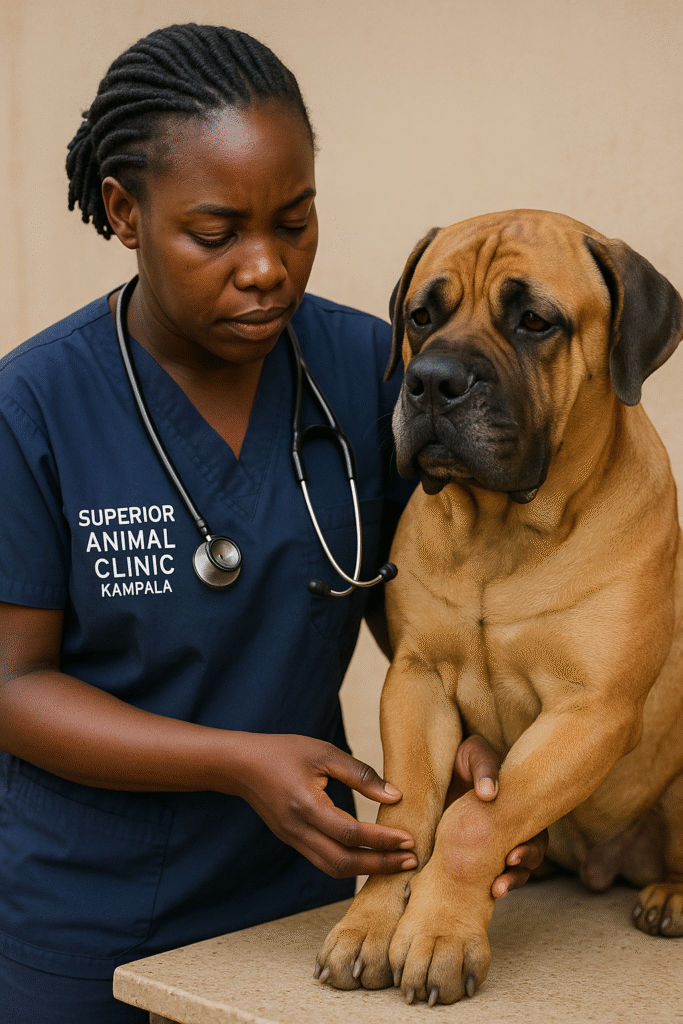
💡 Key Takeaways for Kampala Dog Owners
- Large and active breeds (Labradors, German Shepherds, Rottweilers) are most prone to hip dysplasia, elbow dysplasia, and osteoarthritis. Early supplementation is critical.
- Small breeds (Maltese, Shih Tzu, Pomeranians) are at risk for patellar luxation; flavored soft chews make supplementation easy.
- Mixed breeds can develop arthritis or ligament injuries based on weight and activity.
- Early intervention is better than waiting for pain: supplements work best when started before severe joint damage occurs, not after.
- Consistency and the right combination of ingredients (glucosamine, chondroitin, MSM, omega-3) determine how effective supplements are.
🦴 Major Ingredients in Dog Joint Supplements in Uganda — and What Each Does
When you walk into a pet store or veterinary clinic in Kampala, you’ll notice joint supplements listing a variety of ingredients like glucosamine, chondroitin, MSM, and omega-3s. But what do these actually do for your dog’s joints? Understanding the role of each ingredient can help you choose the right supplement and make sure your dog gets the full benefit.
Here’s a breakdown of the most common and effective ingredients found in dog joint supplements sold across Kampala — from Makindye to Ntinda, Kololo, Muyenga, and beyond.
1. Glucosamine
What it is: A natural compound found in healthy cartilage.
What it does: Glucosamine helps repair cartilage and maintain its elasticity. Think of it as the building block that keeps joints smooth and shock-absorbent.
Why it matters: Dogs with arthritis or degenerative joint disease often have reduced glucosamine in their cartilage. Supplements help replenish it, reducing stiffness and improving mobility.
Local context: Many tablets, powders, and chewable supplements in Kampala rely on glucosamine as their primary ingredient because it’s safe, effective, and widely studied.
2. Chondroitin Sulfate
What it is: A natural molecule that attracts water into the cartilage.
What it does: Keeps cartilage lubricated and helps prevent its breakdown. Works synergistically with glucosamine for stronger, healthier joints.
Why it matters: In active or large breeds (like Labradors, German Shepherds, and Rottweilers in Kampala), cartilage wears down faster due to weight and activity. Chondroitin slows this degeneration.
3. MSM (Methylsulfonylmethane)
What it is: An organic sulfur compound found naturally in some foods.
What it does: Reduces inflammation, eases pain, and supports connective tissue health. It also contributes to the formation of collagen in joints.
Why it matters: MSM is particularly helpful for dogs with arthritis, post-surgical recovery, or those showing early signs of joint stiffness.
4. Omega-3 Fatty Acids (EPA/DHA)
What it is: Essential fatty acids commonly sourced from fish oil or algae.
What it does: Acts as a natural anti-inflammatory, reducing joint swelling and discomfort. Also supports heart, skin, and coat health.
Why it matters: In Kampala’s warm urban environment, dogs are prone to inflammation from exercise or injury. Omega-3s help reduce daily joint stress and promote overall wellness.
5. Hyaluronic Acid
What it is: A natural substance found in joint fluid that keeps cartilage well-lubricated.
What it does: Improves shock absorption in the joints and reduces friction, helping dogs move more comfortably.
Why it matters: Senior dogs or those with osteoarthritis in Kampala benefit because this ingredient restores joint fluid that naturally declines with age.
6. Collagen / UC-II (Undenatured Type II Collagen)
What it is: A protein that forms the structural framework of cartilage. UC-II is a specific form that triggers the body to maintain healthy cartilage.
What it does: Strengthens joint tissues and supports cartilage repair.
Why it matters: Dogs recovering from injury, post-surgery, or with chronic joint conditions in Uganda often need collagen to rebuild and maintain joint integrity.
7. Vitamins and Minerals (Vitamin E, Zinc, Manganese)
What they are: Essential nutrients that help your dog’s body function optimally.
What they do: Act as antioxidants, reduce joint inflammation, and support tissue repair.
Why they matter: Vitamins and minerals enhance the effectiveness of glucosamine, chondroitin, and collagen — giving your dog a complete joint support package.
💡 Vet Tip from Superior Animal Clinic:
“When selecting a joint supplement, it’s not about having the most ingredients — it’s about having the right combination and quality. A simple formula with glucosamine, chondroitin, MSM, and omega-3s is often more effective than a complicated product with unproven extras.”
Quick Comparison of Key Ingredients and Benefits
| Ingredient | Primary Benefit | Best For |
| Glucosamine | Cartilage repair & maintenance | Aging dogs, arthritis, post-injury |
| Chondroitin | Lubrication & cartilage protection | Large/active breeds |
| MSM | Reduces inflammation & supports connective tissue | Arthritic dogs, post-surgery |
| Omega-3 | Natural anti-inflammatory & joint comfort | Active dogs, senior dogs |
| Hyaluronic Acid | Joint lubrication & shock absorption | Senior dogs, osteoarthritis |
| Collagen / UC-II | Cartilage rebuilding & strength | Post-injury, chronic joint issues |
| Vitamins & Minerals | Tissue repair & antioxidant support | All dogs on supplements |
🐶 How to Choose the Right Type of Joint Supplement for Your Dog In Kampala, Uganda
Not all joint supplements are created equal — and not every dog needs the same form or dosage. The right joint supplement depends on your dog’s age, breed, size, diet, lifestyle, and current health status. Choosing wisely ensures your pet gets the maximum benefit without side effects or wasted money.
Here’s how to match the supplement type to your dog’s specific needs — based on what veterinarians at Superior Animal Clinic, Kampala commonly recommend.
🐾 1. For Puppies and Young Dogs
Best Form: Powder or Liquid Supplements
Why: Puppies are still developing their bones and cartilage, so they need gentle, easily absorbed nutrients. Liquids and powders blend smoothly into puppy food and ensure consistent dosing.
Purpose:
- Strengthens growing joints and bones.
- Prevents early cartilage damage in large-breed puppies like German Shepherds, Rottweilers, and Golden Retrievers.
- Encourages proper bone development for active puppies.
Pro Tip: Start supplements early for large breeds — ideally between 3–6 months — to reduce future risks of hip dysplasia or elbow problems.
🦮 2. For Large and Working Breeds
Best Form: Chewable Tablets or Capsules
Why: Large breeds such as Labradors, German Shepherds, Rottweilers, and Boerboels bear a lot of weight on their joints. These dogs need higher doses of glucosamine and chondroitin, which are easier to deliver through concentrated tablets or capsules.
Purpose:
- Maintains cartilage strength under heavy activity.
- Reduces the risk of joint inflammation and stiffness.
- Supports endurance for dogs used in security, herding, or sport.
Pro Tip: Look for joint supplements that also contain Omega-3 fatty acids and MSM — these enhance mobility and reduce inflammation naturally.
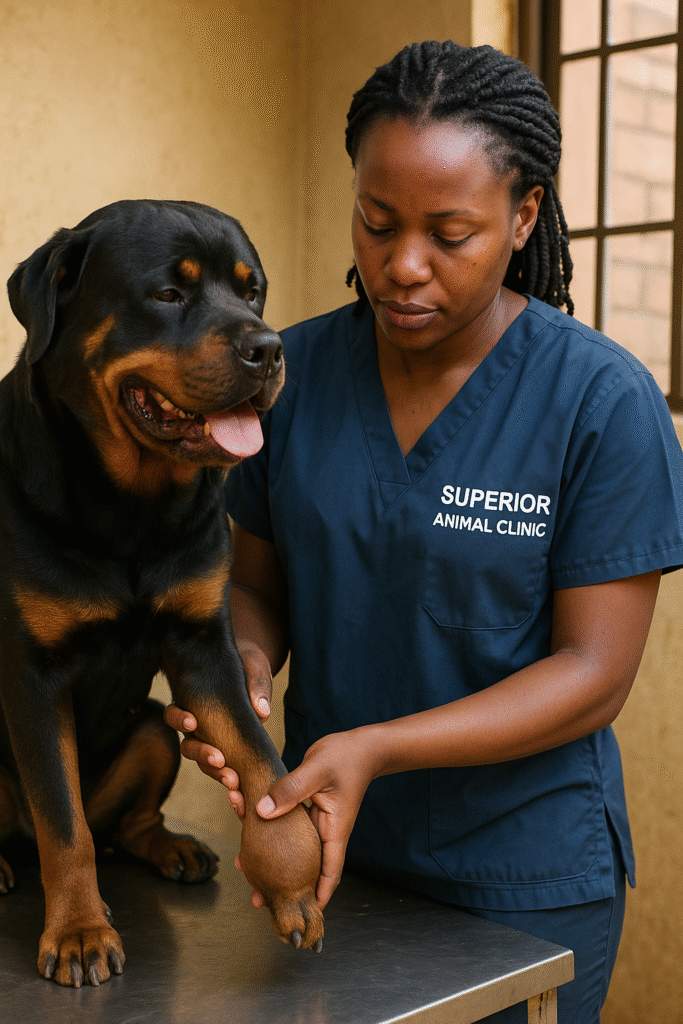
🐕 3. For Senior or Arthritic Dogs
Best Form: Liquid or Powder Supplements
Why: As dogs age, their joints lose lubrication and flexibility. Liquids and powders are gentle on aging digestive systems, easy to mix into food, and absorbed faster — bringing visible relief sooner.
Purpose:
- Reduces stiffness and improves walking comfort.
- Slows the progression of arthritis and degenerative joint disease.
- Improves energy and mood in older dogs.
Example: Older Labradors and German Shepherds in Kampala often struggle with early morning stiffness — a liquid supplement added to their breakfast can help them move comfortably throughout the day.
🐩 4. For Small or Picky Eater Dogs
Best Form: Flavored Soft Chews or Treat-Based Supplements
Why: Small breeds like Poodles, Shih Tzus, Maltese, or Chihuahuas can be notoriously picky with tablets or powders. Soft chews and treat-style supplements disguise the medicine in tasty flavors like beef or chicken.
Purpose:
- Makes daily supplementation fun and stress-free.
- Ensures even the fussiest eaters get their nutrients.
- Ideal for preventive care in small indoor dogs with limited exercise.
Pro Tip: Always check the label for calorie content if you’re giving supplement treats daily to avoid unwanted weight gain.
🧡 5. For Dogs Recovering from Injury or Surgery
Best Form: Liquid or Capsule Supplements (Vet-Prescribed)
Why: Dogs healing from fractures or orthopedic surgeries benefit from concentrated doses of joint-repair nutrients. Liquids provide quick absorption, while capsules offer sustained nutrient release.
Purpose:
- Boosts cartilage regeneration and bone recovery.
- Reduces inflammation and post-surgery stiffness.
- Helps restore full mobility faster.
Example: At Superior Animal Clinic, we often recommend liquid glucosamine combined with MSM and collagen for post-surgery recovery cases.
🐕🦺 6. For Dogs with Sensitive Stomachs or Allergies
Best Form: Liquid or Hypoallergenic Powder Formulas
Why: Some dogs react poorly to artificial flavors or additives in chewable tablets. Hypoallergenic powders are made from natural sources and are easier on digestion.
Purpose:
- Prevents diarrhea, bloating, or food aversion.
- Provides essential joint nutrients without upsetting the stomach.
- Works well for dogs with a history of skin allergies or dietary sensitivities.
Pro Tip: Always read the ingredient list — avoid supplements with artificial colorings or unnecessary fillers.
🩺 7. Always Consult a Veterinarian Before Choosing
Every dog is unique — even two dogs of the same breed can have completely different joint health needs.
Before buying any supplement in Kampala, schedule a quick joint evaluation at Superior Animal Clinic. Your vet will:
✅ Assess your dog’s mobility and joint flexibility.
✅ Recommend the right supplement form and dose.
✅ Check for any existing health conditions or medication interactions.
Remember: the goal isn’t just to give supplements — it’s to give the right one for your dog’s body and lifestyle.
📌 Quick Summary: Matching Form to Dog Type
| Dog Type | Recommended Supplement Form | Why It Works Best |
| Puppies | Powder / Liquid | Gentle, easy to mix, supports growth |
| Large / Active Dogs | Chewable Tablets / Capsules | Concentrated, strong doses |
| Senior / Arthritic Dogs | Liquid / Powder | Fast-absorbing and easy to digest |
| Picky Eaters | Soft Chews / Treats | Tasty, easy to administer |
| Dogs with Sensitive Stomachs | Hypoallergenic Powder / Liquid | Gentle on digestion |
| Post-Surgery / Injured Dogs | Capsule / Liquid | High strength for recovery |
Side effects and safety
- Common: mild gastrointestinal upset (vomit, loose stool), especially when first starting. Give with food to reduce this.
- Less common: allergic reactions, changes in behaviour, or interactions with other meds (e.g., blood thinners — consult vet).
- Quality control concern: supplements are less strictly regulated than medicines. Buy from reputable suppliers and avoid suspiciously cheap or unlabeled products.
🌿 Natural Alternatives and Lifestyle Measures for Healthy Dog Joints (What Really Helps)
While joint supplements are highly effective, they aren’t the only way to support your dog’s mobility. Many natural approaches and lifestyle measures can make a big difference — often reducing the need for high doses of supplements, easing discomfort, and improving long-term joint health.
Here’s what works — based on years of experience with dogs across Makindye, Ntinda, Kololo, Muyenga, and other Kampala neighborhoods.
🐾 1. Maintain a Healthy Weight
One of the most important things you can do for your dog’s joints is to prevent excess weight. Every extra kilogram adds stress to the hips, knees, and elbows, accelerating wear and tear.
- Practical Tip for Kampala owners: Measure your dog’s food carefully — avoid “human table scraps” like matoke or rolex that add calories.
- Benefit: Even a small weight reduction can significantly reduce joint pain and improve mobility.
- Extra: Pair weight management with controlled walks — slow, short walks first, then gradually increase distance.
🏃 2. Regular, Low-Impact Exercise
Not all exercise is created equal. Overly strenuous activity can damage joints, but controlled, low-impact exercise strengthens muscles that support joints.
- Best options:
- Swimming in clean pools or safe ponds — gentle on hips and knees.
- Controlled walks on soft ground rather than hard pavement.
- Gentle play with soft toys instead of high jumps.
- Swimming in clean pools or safe ponds — gentle on hips and knees.
- Why it works: Stronger muscles stabilize joints, reduce pain, and improve flexibility.
🥗 3. Nutritious, Balanced Diet
Feeding a high-quality diet ensures your dog gets nutrients that naturally support joint health.
- Include:
- Omega-3 rich foods (like fish oil, sardines, or flaxseed oil) to reduce inflammation.
- Protein-rich sources to maintain strong muscles.
- Antioxidant-rich vegetables (carrots, pumpkin, green beans) for overall tissue repair.
- Omega-3 rich foods (like fish oil, sardines, or flaxseed oil) to reduce inflammation.
- Tip for Kampala owners: Mix small amounts of fresh, cooked local veggies into kibble or high-quality commercial diets for added joint support.
🌿 4. Anti-Inflammatory Herbs and Natural Remedies
Certain natural substances can complement supplements:
- Turmeric (Curcumin):
- Powerful anti-inflammatory properties.
- Can be mixed into meals in tiny amounts (start with a pinch for small dogs, up to ½ teaspoon for large dogs).
- Powerful anti-inflammatory properties.
- Ginger:
- Helps improve blood circulation and reduce joint stiffness.
- Can be added to food occasionally.
- Helps improve blood circulation and reduce joint stiffness.
- Omega-3 from fish oil or flaxseed:
- Reduces joint inflammation and supports cartilage health.
- Reduces joint inflammation and supports cartilage health.
⚠️ Always consult your vet before adding herbs — especially for dogs on medications, because some herbs can interact with prescription drugs.
🛌 5. Comfortable Sleeping and Rest Areas
Soft, supportive bedding reduces stress on joints while your dog rests.
- Tip: Use orthopedic dog beds for older or arthritic dogs.
- Avoid: Sleeping on hard floors or concrete, which can worsen stiffness over time.
💆 6. Massage and Gentle Physiotherapy
Regular massage can increase circulation, reduce muscle tension, and improve joint flexibility.
- How to do it: Gently rub the hips, shoulders, and legs in a circular motion for a few minutes daily.
- Optional: Veterinary physiotherapists in Kampala can guide you on stretching exercises tailored to your dog’s breed and condition.
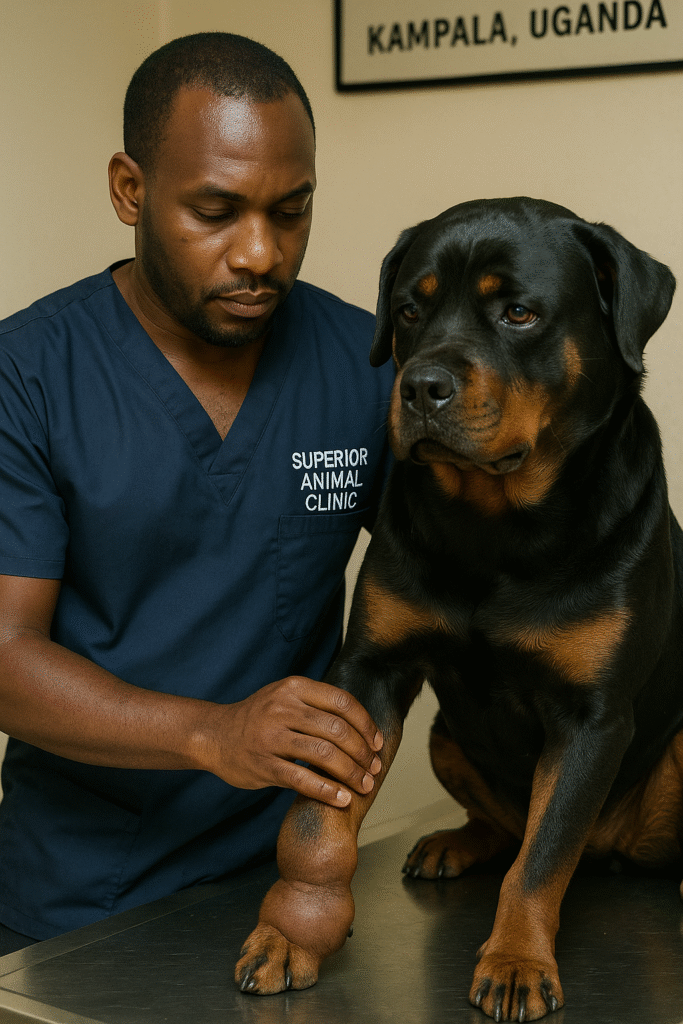
🌦️ 7. Climate Considerations
Kampala’s humid or rainy season can affect dogs with arthritis or sensitive joints.
- Tip: Limit outdoor activity during heavy rain or cold, damp mornings.
- Extra: Keep dogs warm with light dog jackets for breeds prone to stiffness in cooler, wet weather (like Huskies or German Shepherds).
🐶 8. Monitor Activity and Track Improvements
The most effective lifestyle changes are tracked over time.
- Keep a small log of:
- Daily walks and duration
- Signs of stiffness or limping
- Appetite and energy levels
- Daily walks and duration
- This helps your vet fine-tune supplements, diet, and exercise routines.
💡 Key Takeaway
Natural alternatives and lifestyle measures work best alongside joint supplements. A dog that:
- Maintains a healthy weight,
- Gets controlled low-impact exercise,
- Eats a balanced diet with omega-3s,
- Enjoys comfortable bedding,
- Receives gentle massage or physiotherapy,
…will have a stronger, healthier joint system, recover faster from injuries, and enjoy longer, more active years.
At Superior Animal Clinic, we help dog owners in Kampala implement holistic joint care plans, combining supplements, diet, exercise, and natural therapies — so your dog stays happy, active, and pain-free.
🐶 FAQs: Dog Joint Supplements in Kampala, Uganda
1. What are the best joint supplements for dogs in Kampala?
The best joint supplements for dogs in Kampala are those that contain glucosamine, chondroitin, MSM, and omega-3 fatty acids. Popular forms include powders, chewable tablets, and liquid supplements, available at veterinary clinics like Superior Animal Clinic in Makindye and pet stores across Ntinda, Muyenga, Kololo, and Rubaga.
2. How much do dog joint supplements cost in Kampala?
Prices vary depending on the type and brand:
- Powder supplements: UGX 200,000 – 400,000
- Chewable tablets/soft chews: UGX 15000
- Liquid supplements: UGX 180,000 – 350,000
- Veterinary injectables: UGX 80,000 – 150,000 per dose
Prices may differ between clinics and neighborhoods like Ntinda, Makindye, Muyenga, Kololo, and Kansanga.
3. Which dog breeds in Kampala need joint supplements the most?
Large and active breeds such as Labradors, German Shepherds, Rottweilers, Golden Retrievers, and Boerboels are more prone to joint problems in Kampala. Senior dogs of any breed, dogs recovering from surgery, and those with arthritis also benefit from joint supplements.
4. At what age should I start giving my dog joint supplements?
- Puppies of large breeds: from 3–6 months to support bone and joint development.
- Adult or senior dogs: from 5–6 years, or earlier if diagnosed with joint issues.
- Consult a vet at Superior Animal Clinic, Makindye to determine the exact age and dosage for your dog.
5. Can joint supplements prevent arthritis in dogs?
Yes, joint supplements with glucosamine, chondroitin, and omega-3 fatty acids can help maintain cartilage health and reduce the risk of arthritis. Consistent use, combined with a healthy diet, controlled exercise, and weight management, provides the best preventive results for dogs in Kampala.
6. How do I give joint supplements to my dog?
- Powders: Mix with wet or dry food.
- Liquid: Pour over meals or use a syringe.
- Chews / Tablets: Give as a treat or hide in food.
- Injectables: Administered only by a veterinarian at clinics like Superior Animal Clinic.
Always follow the recommended dosage based on your dog’s breed, size, and age.
7. Are there natural alternatives to joint supplements for dogs in Kampala?
Yes! Natural measures include:
- Maintaining a healthy weight
- Low-impact exercise (walking, swimming)
- Omega-3 rich foods (fish oil, sardines)
- Anti-inflammatory herbs like turmeric and ginger (consult a vet first)
- Orthopedic beds and physiotherapy
These can complement supplements for overall joint health.
8. What are the side effects of dog joint supplements?
Most dogs tolerate joint supplements well, but some may experience:
- Mild diarrhea or upset stomach
- Allergic reactions to ingredients in chews or powders
- Over-supplementation can cause kidney strain in rare cases
Always consult a vet in Kampala before starting a new supplement, especially for dogs with pre-existing health conditions.
9. Where can I buy dog joint supplements in Kampala?
Joint supplements are available at:
- Veterinary clinics such as Superior Animal Clinic, Makindye
- Pet stores in Kololo, Ntinda, Muyenga, Rubaga, and Kansanga
- Some online platforms serving Kampala like Jumia Uganda
Buying from a clinic ensures quality, veterinary-approved supplements, and personalized dosage advice.
10. How long does it take for joint supplements to work in dogs?
Most dogs show improvement within 4–8 weeks, though it may take longer for severe arthritis. Consistency is key — giving supplements daily, along with weight management, diet, and exercise, produces the best results.
11. Can small breed dogs in Kampala benefit from joint supplements?
Yes! Even small breeds like Shih Tzus, Pomeranians, and Maltese can develop joint stiffness, especially as they age. Soft chews or liquid supplements are ideal for these breeds, making administration easier.
12. Are injectable joint supplements better than oral supplements?
Injectables work faster and are more potent, especially for dogs with advanced arthritis or post-surgery recovery, but they require veterinary administration. Oral powders, chews, and liquids are suitable for daily maintenance and preventive care.
13. Who is the best vet for dog joint supplements in Kampala?
The Superior Animal Clinic in Makindye is highly recommended for joint health management. Our vets provide personalized assessment, dosing advice, and follow-up care for dogs of all breeds across Ntinda, Muyenga, Kololo, Rubaga, Kansanga, and surrounding neighborhoods.
14. Can joint supplements help dogs with hip dysplasia in Kampala?
Yes. Dogs with hip dysplasia, especially German Shepherds, Labradors, and Rottweilers, can benefit from glucosamine, chondroitin, MSM, and omega-3 supplements. Combined with weight management and physiotherapy, supplements reduce pain and improve mobility.
15. How often should I give joint supplements to my dog?
Most joint supplements are given once or twice daily, depending on the form and dog’s weight. Your vet can create a personalized schedule to maximize benefits. Consistency is more important than timing.
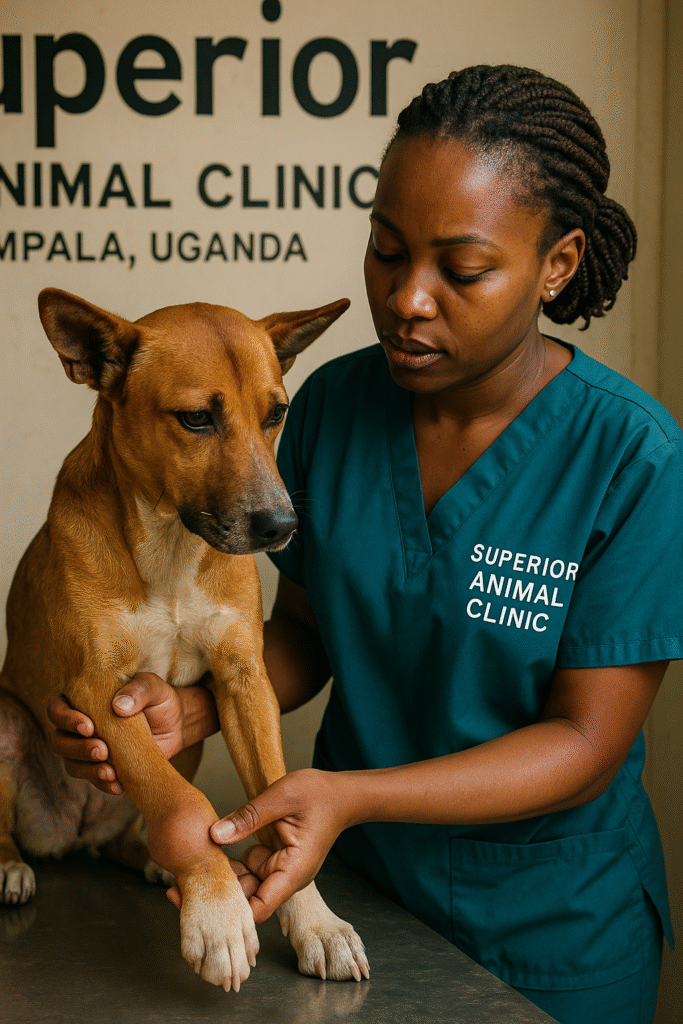
16. Can I combine different types of joint supplements?
Yes, but only under veterinary guidance. For example:
- Liquid glucosamine for morning meals
- Chewable MSM + chondroitin in the evening
Combining types can enhance absorption and convenience, but avoid over-supplementation.
17. Are there side effects if my dog takes too many joint supplements?
Excessive supplementation can lead to:
- Diarrhea or vomiting
- Loss of appetite
- Kidney strain in rare cases
Always follow veterinarian-recommended doses, especially for dogs in Makindye, Ntinda, or Muyenga.
18. Do puppies need joint supplements if they are still young?
Large-breed puppies benefit from early supplementation (3–6 months) to strengthen developing joints and prevent conditions like hip or elbow dysplasia. Small-breed puppies usually do not need supplements unless advised by a vet.
19. How do I know if my dog in Kampala needs joint supplements?
Signs include:
- Limping or stiffness, especially after walks
- Difficulty climbing stairs or jumping
- Reduced activity or reluctance to play
- Visible discomfort when standing
A veterinary assessment at Superior Animal Clinic can confirm if supplements are needed.
20. Can joint supplements replace vet care for arthritic dogs?
No. Supplements support joint health but cannot replace medical care. Dogs with arthritis or severe joint conditions may need:
- Pain management medication
- Physical therapy
- Weight management and exercise plan
Consult a vet for a comprehensive treatment plan.
21. Can I give human joint supplements to my dog in Kampala?
No. Human supplements often contain ingredients or doses unsafe for dogs. Always use vet-approved canine joint supplements from clinics or pet stores in Kampala.
22. How long does it take for joint supplements to show results in dogs?
Most dogs show improvement in 4–8 weeks, though older dogs or severe arthritis cases may take longer. Consistency, diet, and exercise affect how quickly your dog benefits.
23. Are there affordable joint supplements for dogs in Kampala?
Yes. Clinics like Superior Animal Clinic in Makindye and local pet stores in Ntinda, Rubaga, Kololo, and Muyenga offer a range of supplements to suit different budgets, including powders, chewables, and liquid forms.
24. Can lifestyle changes improve joint health without supplements?
Absolutely. Lifestyle measures that help include:
- Weight management
- Regular low-impact exercise
- Nutritious diet rich in omega-3s
- Comfortable bedding and joint massages
Combining these with supplements gives the best long-term results.
25. Where can I buy high-quality dog joint supplements near me in Kampala?
High-quality, vet-approved joint supplements are available at:
- Superior Animal Clinic, Makindye
- Pet stores in Ntinda, Muyenga, Kololo, Rubaga, and Kansanga
- Online platforms serving Kampala, such as Jumia Uganda, with home delivery options
26. Where can I find affordable dog glucosamine in Muyenga?
Veterinary clinics and pet shops in Muyenga offer powder, chewable, and liquid glucosamine at price UGX 15,000.
🐾 Conclusion
Caring for your dog’s joints isn’t just about supplements — it’s about a holistic approach: the right diet, regular gentle exercise, comfortable bedding, and timely vet check-ups. Whether you have a playful puppy in Ntinda, a senior Labrador in Makindye, or a German Shepherd in Kololo, early care makes a world of difference.
At Superior Animal Clinic, we guide dog owners across Kampala on choosing the right joint supplements and lifestyle measures tailored to their pets. Start today, and give your furry friend the gift of mobility, comfort, and happy, active days.
Tip for pet owners: Notice stiffness, limping, or reluctance to play? Don’t wait — book a joint health check at Superior Animal Clinic and see how small changes today can mean a lifetime of comfort for your dog.

Acespuer… never heard of it before. Gotta be honest. But I’m always down to try somethin’ new. Anyone else playin’ here? What’s the verdict? Go check it out: acespuer
Thanks for sharing. I read many of your blog posts, cool, your blog is very good.
Your article helped me a lot, is there any more related content? Thanks! https://wp.signnow.com/blog/building-vs-buying-esignature-api/?unapproved=3081&moderation-hash=1c001ff09fe9b2c2ce1e5debdf4110d8#comment-3081